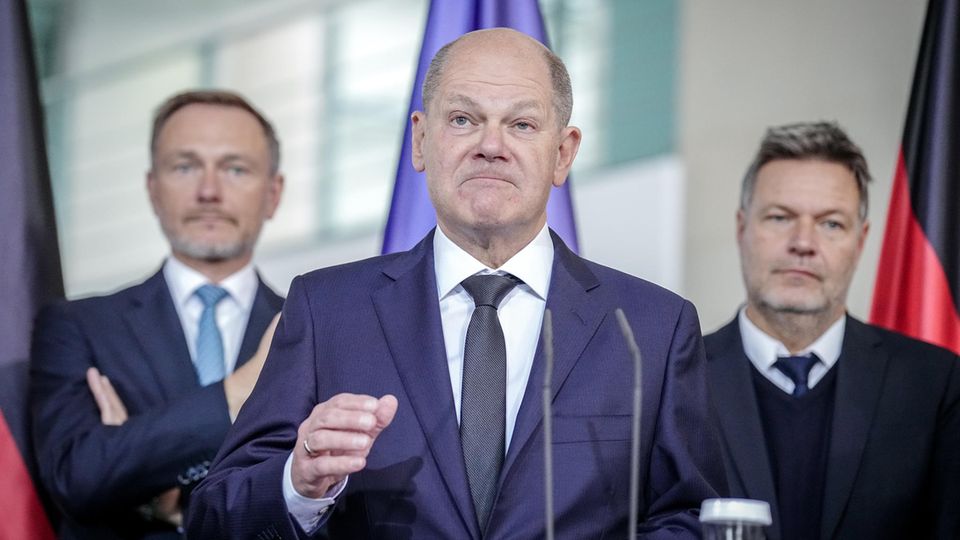The Constitutional Court’s ruling on the 2021 supplementary budget destroys the federal government’s financial plan – at exactly the right time, says ZEW economist Friedrich Heinemann.
Mister Heinemannhow disastrous is the verdict from Karlsruhe?
From an economist’s perspective, this is not disastrous at all. It is of course extremely unpleasant for the federal government because the verdict is very clear and unambiguous, with no room for maneuver for the traffic light coalition. It was the hardest possible outcome for her. But the verdict comes at exactly the right time, because budget negotiations are currently underway and money is about to be thrown out in spades again. Example of VAT: The coalition is currently on the verge of extending the tax subsidy for the catering industry. During the pandemic, she reduced the tax rate from 19 to seven percent. That’s 3.5 billion euros every year, although there is no longer any argument for this subsidy. The verdict is actually exactly right because it tells the government: That’s not how it works. You have one Debt brakeand you can’t just cheat your way around it creatively.
But the danger now is that the traffic light government will block itself again and the budget negotiations will drag on enormously.
Yes, she needs to reprioritize now. This is of course politically embarrassing for the traffic light. She now has to turn over every euro two or three times. But we can’t care about the government having as pleasant a job as possible; it has to be about ensuring that it handles money very carefully, and that wasn’t always the case. The situation is now extremely difficult for the government because 60 billion cannot be collected in a budget adjustment. But you can start with it.
How quickly does the government have to cut spending now? climate– and transformation funds (KTF)?
The good thing is that the 60 billion would not have been spent completely next year, but was planned as a multi-year outflow from the climate and transformation fund. In this respect, the government can spread the adjustments over several years. It is also not the case that the current core budget or the Household would be formally blocked for 2024, both are unaffected. What the government should consider is whether it can declare a new crisis in order to raise a special fund for it, as was the case with the corona pandemic. But that would be another operation that would hardly comply with the constitution because we simply do not have a serious, acute crisis situation.
Economics Minister Robert Habeck says that all planned expenditure will be carried out, including, for example, the billion-dollar subsidies for the chip factory Intel in Magdeburg. How is that supposed to work if suddenly only 40 billion of the 100 billion euros in the KFT are left?
Let’s put it this way: A sum of 10 billion euros, like the one Intel is supposed to get, can certainly be found somewhere. That should be possible, even within the framework of the constitution. Germany cannot actually withdraw financial commitments that have already been made because the image and credibility of the Federal Republic would then be at stake. Ultimately, if you have a budget restriction, you have to ask: What possibilities are there to make savings – or, on the other hand, to discuss tax increases. Finance Minister Lindner has already ruled this out and the tax burden on employees in this country is already comparatively high.
What can the government do, which items does it have to cut?
We have the debate about citizens’ benefit, which is rightly gaining momentum, the lack of pay gap is becoming more and more of a problem and incentives to work are being lost. Basic child security is also highly controversial in view of the new bureaucracy associated with it. But the biggest chunk in the federal budget is the subsidy for pension insurance. The Council of Experts has just presented proposals that were immediately wiped away. Then the Chancellor says: At 67, work is over. Of course, if you suppress reality like that, then you have no solution. But the debt brake is there to say to politicians: Guys, you have a budget restriction and you have to face the realities. There are many taboos, and this would be the occasion.
What about abolishing tax subsidies such as spousal splitting – that could bring the state a lot of additional revenue?
We have a lot of very problematic tax exemptions. You can collect a lot there. There are many poorly motivated applications of reduced VAT as well as subsidies that are still flowing to agriculture. In income tax, the distance allowance could be put to the test. With regard to life planning for families, the issue of spousal splitting can only be changed very slowly at best. In terms of tax policy, however, it would be important to provide incentives for greater willingness to work. That would be of great benefit to the treasury given the labor shortage everywhere.
So would the best solution be to soften the debt brake or to abolish it completely?
Abolishing the debt brake would be a fatal solution. Then we would leave behind a heap of financial shambles for future generations. It’s about reforming them. A lot of things point towards the question: Do we need a larger debt window and an expansion of the debt brake? But this requires a constitutional change, as recently happened with the special fund for the Bundeswehr. The change in the Basic Law was possible under the shock of the Russian attack on Ukraine, but the Karlsruhe ruling is a different kind of shock.
The CDU and CSU are likely to resist expanding the debt brake.
Well, the Union does exactly the same thing as the traffic lights in the federal states. In North Rhine-Westphalia and Berlin, the Union-led state governments have set up special funds that, according to today’s ruling, are just as much a constitutional violation as the debt operation with the Climate and Transformation Fund. They’re all in the same boat. That’s why the Union has absolutely no reason to be angry. Rather, she should be prepared to negotiate.
How could the debt brake be meaningfully reformed?
By determining what we might want to take on more debt for. This can apply to clear investment spending that will almost certainly increase Germany’s growth potential – and thus also improve debt sustainability. For example, if we modernize digital networks. To do this, you can open debt windows within the debt brake. That would be a solution because you would say: We finance the tasks that actually benefit future generations. This can be future-oriented spending in the area of digitalization, but also spending on adapting to climate change. To do this, we would allow new debt to be taken on as part of a new, modified debt brake. By the way, this is exactly the debate we are currently having in Europe about reforming the European fiscal rules.
How far should the scope for new debt extend?
That would have to be decided depending on the situation and situation. Above all, governments must ensure that this leeway is not indirectly abused to pay for the next pension increase. If you open the debt window to finance investments, there is always a risk that the budget will spend the tax resources released by the debt elsewhere. So you have to think carefully about it. But I think it’s doable. It is better to reform the debt brake than to constantly violate it.
But a reform of the debt brake is unlikely to come so quickly. Companies in Germany, on the other hand, now need planning security. So do you think that the economy will call off the ecological transformation for now?
The government should now take a more serious look at what economists have been saying for years, most recently in the report by the Council of Experts: namely that an ambitious climate policy does not have to be fiscally costly. It requires the courage to do more to control the CO2 price – to expand it more quickly and boldly to other sectors and then to cushion the social hardships with climate money. The fact that climate policy is currently so fiscally expensive is based on this whole twisted approach that believes that citizens cannot be visibly burdened with the climate costs and that the tax authorities therefore have to pay for everything. Ways can be found that do not involve such high public expenditure.
This interview appeared first at this point in the business magazine “Capital”which, like stern, is part of RTL Deutschland.


